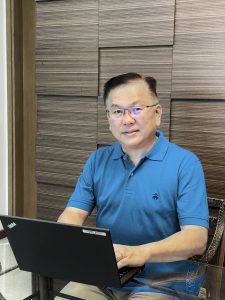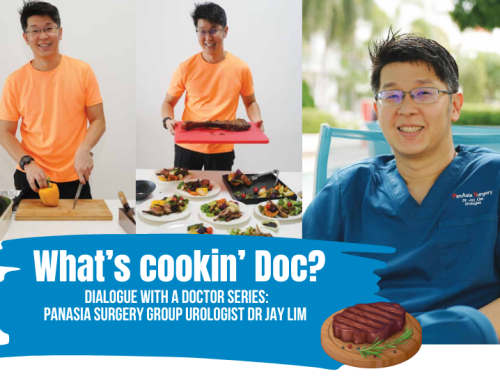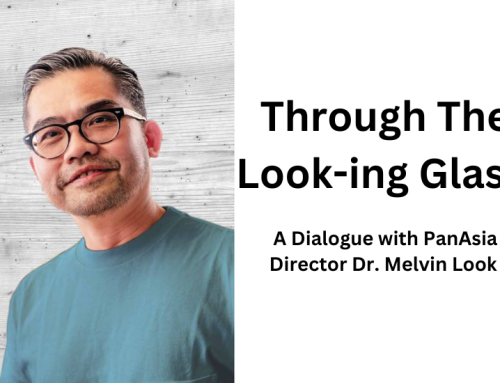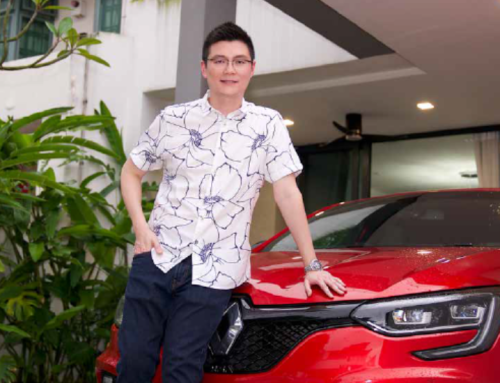Dialogue with A Doctor: Oticon’s Managing Director Tony Lee

Sound, sight, taste, smell and touch. We use these important five senses everyday, yet we also often take them for granted. Unless we lose them. Then the sensations we used to enjoy become more conspicuous due to their absence.
Hence, it is important to protect and care for our five senses, to address any problems that we may have. Imagine a world where you cannot witness the wonders of the world; or a world where you are unable to listen to the beauty of music.
For this issue, we have the privilege of speaking with Mr. Tony Lee, Managing Director of Oticon Singapore. Oticon is one of the world’s leading companies in hearing care. We gather from Mr. Lee, his perspectives on various health issues and uncover among other insights, the possible neglect of hearing loss.
Good afternoon, Mr. Lee. Let us begin by pondering on a single word: Health. What comes to your mind?
MR TONY LEE: I think I can speak for just about everyone when I say this is one of the most important words for us all on a personal level. Since young, I have always felt that health is a critical aspect of life, but especially more so as I grow older. You notice the little things. Maybe you cannot move as fast as you were able to, maybe you cannot run as long as you would like to, maybe you cannot hear as well as you used to, or maybe your train of thought is not as nimble as it was. For me, health is about the state of body and mind. And there is also the issue of wellness. More often than not, this term tends to refer to or is more closely associated with staying healthy and preventing yourself from falling ill.
Speaking of the state of body and mind, how do you take care of your body? What are the different facets that you look at?
TL: As you brought up, there are different things to consider when we talk about taking care of our body. The two most common ideas that come to mind are exercise and diet. In terms of exercise, I do exercise 2-3 times a week playing badminton for about 2 hours each time, but I have to confess: I am also a foodie. So, I am always on the lookout for good food. It becomes a balance of how much and what I eat versus doing more exercise if possible.
I believe one can have a healthy lifestyle even while busy working. I certainly try. And I believe we can all try as well. Since I enjoy food very much and also entertain on a regular basis, I realise the importance of exercise as a counterweight and I try to exercise on a regular basis.
I think my love of food and my busy worklife is not unique. This is probably true for many people in Singapore. Maintaining an exercise regime requires commitment.
Indeed. As a foodie, how do you maintain discipline when it comes to something that you love so much?
TL: I think discipline can mean a number of things. One of this should be about taking in regular meals every day. Our body needs energy to get through the working day and this energy comes from food. We need the energy to perform. For me, I certainly must have regular meals everyday, be it small or big. However, I do not particularly worry about having them at a consistent timing. That can vary.
I do not “eat to live” but rather “live to eat”. That is the nature of being a foodie, I guess. I enjoy food and will go out of the way to find good food. Having a good and enjoyable meal is important to me and I will always recommend my discoveries to my friends whenever I find something good.
What do you make of diets?
TL: For someone who loves food, it is difficult to go on a diet. However, I do believe in having a balanced diet. More vegetables, less meat. So I started having more greens and less meat. I have also stopped eating beef in order to cut down on my red meat consumption.
Having a balanced diet is applicable to outside meals and eating at home. Most of us eat about just as many meals outside as we do at home. At my home, we do not use MSG for cooking. We also use less salt and sugar. We tend to steam our food rather than fry them.
We do, however, indulge ourselves whenever we go out for family meals and do not restrict ourselves. My family does tend to eat healthier than me, especially my kids. All three of my children were studying abroad. When they came back, they continue the good eating habits they have cultivated overseas and eat more greens and less rice here as well.
Do these healthy habits come naturally for you? How do you think they have impacted on your health?
TL: I have been a very sporty person since I was young. I participated and represented many sport activities in school. This has continued into my adulthood where I still actively play badminton 2-3 times a week, usually with a group of friends. Due to my background, I have found that maintaining an exercise regime comes fairly naturally for me. But one needs to know one’s body well to know what type of activity is suitable for him or herself. If you never used to do any exercise and just jump into it as a means of launching into a healthy lifestyle, without much thought into intensity or existing body conditions, it may hurt your body rather than bring any benefits.
Finally, I want to be honest. I am not sure whether these activities, both physical and dietary, have improved or changed my health substantially. But they have at least helped to keep me active and maintain my health.
Let’s go outside of exercise and diet, and talk about rest and stress management. How do you manage these aspects?
TL: I think adequate rest is an important part of healthy living. I normally do not stay up late. I try to sleep early at around 10-plus at night and have about eight hours of sleep as much as possible. The good thing about me is that I am someone who can fall asleep easily, so that helps me to get my rest. On weekends, I take short afternoon naps after my games to rest.
No matter what station of life you are in, there will always be stress. Therefore, it is important to learn how to manage stress. Exercise is one way to maintain your sense of well-being and manage stress. It pumps up your endorphins and is meditation in motion. When you play badminton, you will find yourself concentrating only on the trajectory of the shuttlecock and your body’s movements. You do not think about all your worries and irritations. A good game helps to improve your mood too. It might even help you to sleep better, which can be disrupted by stress.
If you do not engage in sports, then do something you enjoy. A hobby or a pastime. Tend to plants, play games, watch movies or keep company with your friends. For me, sometimes I like to have my own quiet time, or talk to and share with a good friend my thoughts and worries.
Having spoken at length about your own experiences, what advice do you have for Prime readers about living a healthy life?
TL: Often, we find ourselves giving excuses that we are too busy and do not have the time to exercise due to family or work commitments. That may be true to a certain extent but personally, I believe it is commitment that makes the difference. We can always find time. It is not likely we are always busy and have no downtime at all. It may not be easy but we sometimes make it even harder for ourselves by being lazy and looking to slack just that little bit.
If you find yourself behaving like that, pick up something that you really enjoy doing. If you feel bored doing it alone, try to join a group of friends or fellow enthusiasts. Then stick to a fixed schedule and stay with it. Try it.
Finally, what aspects of health do you often see people (or have found yourself) neglecting? What should people do (or what did you do) to remedy this?
TL: There was a period when I did not control myself and found all sorts of excuses to eat whatever I want and avoid exercise. And then I suffered a gout attack and I started to become more aware of my body and what I should avoid. I also realised the importance of exercise. I certainly do not wish for others to have to suffer a health problem as well before they recognise the importance of health.
Staying healthy involves awareness and understanding of underlying health issues. Awareness and understanding is often influenced by media coverage. We often see lots of coverage on different issues such as myopia control and elderly dementia, but through my work, I found that many people in Singapore are not aware of or have limited knowledge of how hearing loss can affect one’s life. Maybe this is due to a general lack of coverage on this issue. It could also be because people with visual or mental difficulties are more visible to us in our daily lives. In comparison, you would likely need to interact with a hearing-impaired person before you realise that person has hearing problems.
It is important to learn how to manage stress. Exercise is one way to maintain your sense of well-being and manage stress
Singapore, as a developed nation, has a very low penetration rate of people who have hearing loss and are wearing hearing aids. Unfortunately, hearing loss is also not being treated here extensively, unlike other developed countries. Hearing loss is associated with early dementia, isolation and depression, among other mental health issues. With an increase in our ageing population, staying healthy means understanding our body and what we can screen and address as early as possible. The more we understand, the better the chances of us staying healthy. This then allows us to live our lives to the fullest.
Our five senses are a key part of living well. They are a key part of health. Imagine a world without sound, without hearing your children’s and grandchildren’s voices. And as mentioned, hearing loss can lead to other health problems. Do not leave your hearing problems unaddressed.










